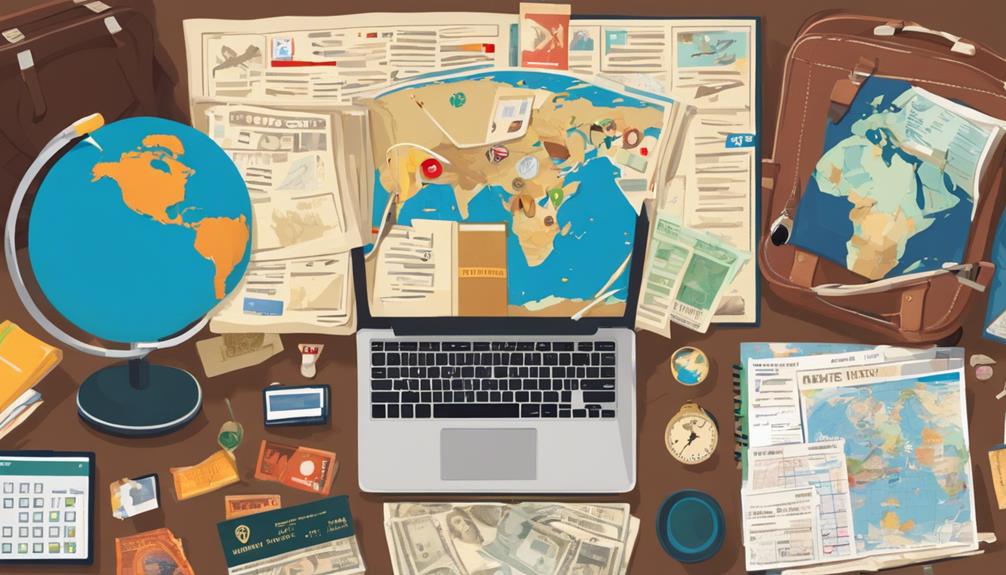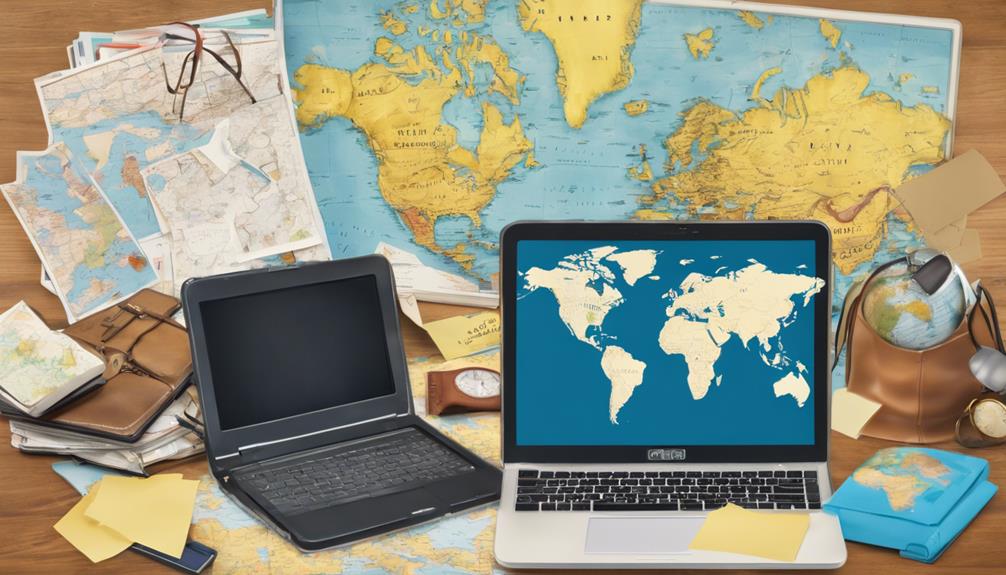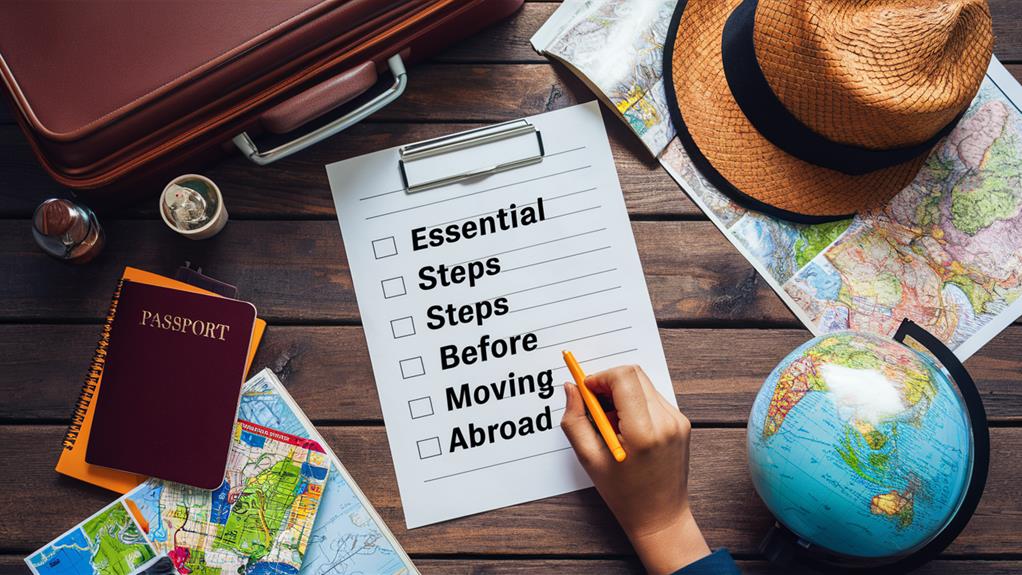Before you move to another country, start planning at least six months ahead. Begin by gathering essential documents like your passport, visa, and medical records. Research the visa requirements for your destination and consult immigration professionals if needed. Investigate housing options, including rental prices and local laws, and budget for moving costs, saving enough to cover at least six months of expenses. Don't forget to look into healthcare options and consider learning the local language to ease your transition. With careful planning, your move can be successful, and there's more valuable information to help you along the way.
Pre-Move Planning Essentials

When you're planning to move abroad, starting at least six months in advance is crucial for a smooth transition.
First, create a moving abroad checklist that includes all the pre-move planning essentials. Gather necessary documents like your passport, visa, medical records, and any legal documents your destination requires. Consulting with immigration professionals can help clarify visa requirements and application timelines.
Additionally, ensure that you're aware of essential documentation requirements specific to your destination, as this can vary significantly from country to country.
Next, research housing options early. Look into both temporary housing and long-term accommodations to find a place that suits your needs. Familiarize yourself with local real estate laws and rental agreements to avoid surprises later.
Budgeting is another vital step. Calculate all potential moving costs, including shipping belongings and housing deposits. Aim to save at least six months' worth of living expenses to give yourself a financial cushion.
Don't forget to account for hidden expenses that can arise unexpectedly.
Immigration and Visa Requirements
Navigating immigration and visa requirements is a crucial step in your move abroad, so starting your research early is essential.
Begin looking into the visa requirements for your destination country at least six months before your move. Some applications can take several months to process, so don't wait until the last minute.
You'll need to gather all essential documents for your visa application, including your passport, proof of financial stability, and any necessary medical records or vaccinations.
Make sure your passport is valid for at least six months beyond your planned arrival date to avoid complications at customs.
Different countries may have specific requirements, so check the official government website for details. You might need additional documentation like background checks or employment letters, depending on the country.
If you're moving with pets, familiarize yourself with the importation laws and health certificates required to bring them into the new country legally.
Taking the time to understand these immigration and visa requirements can help ensure a smoother transition to your new home.
Housing and Logistics Preparation

After handling immigration and visa requirements, the next step is to focus on housing and logistics preparation. First, research the housing market in your destination country. Understanding rental prices, property availability, and neighborhood safety can help you make informed decisions. These factors can vary significantly from your home country, so local knowledge is essential.
Additionally, maintain communication with banks and insurance providers to ensure a seamless transition of services in your new country. Consider reaching out to local real estate agents or relocation consultants. They can provide insights into the best areas to live based on your lifestyle and budget. If you plan to rent, familiarize yourself with local rental laws, including lease terms, security deposits, and tenant rights. This knowledge can help you avoid potential legal issues.
Additionally, evaluate your shipping options by obtaining quotes from at least three international moving companies. This way, you can find a reputable service that fits your budget and timeline. To ensure compliance and avoid import taxes, make sure to prepare all necessary documents for international moves.
Financial and Healthcare Considerations
How can you ensure your financial stability and healthcare needs are met before moving abroad? First, it's crucial to consult an accountant to understand your tax obligations in both your home country and the destination country. Expatriates often face unique tax liabilities, so be prepared.
Additionally, understanding the international moving costs associated with your relocation can help you plan your budget more effectively. Next, research healthcare options and insurance coverage available in your new location. Ensure you'll have adequate medical care and consider if employer-sponsored health insurance is an option.
Organizing your financial documents is vital. Keep bank statements and tax records handy for easy access during your relocation and after settling in.
Additionally, budget for hidden moving costs. On average, expatriates under-budget by around $723, which can greatly impact your financial plans.
Lastly, look into international health insurance for comprehensive coverage, especially in countries where local healthcare may not meet your needs. By addressing these financial and healthcare considerations, you'll set yourself up for a smoother transition and a more secure future abroad.
Cultural and Language Readiness

Cultural awareness can make a significant difference in your experience when moving abroad. Understanding cultural differences, such as traditions and customs, helps you navigate social norms more smoothly and reduces the chance of culture shock.
Start by researching the primary language spoken in your new country. Knowing basic phrases can enhance daily interactions and help you connect with locals.
Consider enrolling in language classes or using language-learning apps to boost your conversational skills before you leave. This preparation not only builds your confidence but also allows you to immerse yourself in the culture right away.
Engaging with community resources or expatriate groups can provide valuable support and insights during your adjustment period. These groups often share experiences and tips that can ease your transition.
Additionally, attending cultural events or exploring literature and films from your new country deepens your understanding and appreciation of its heritage.
Conclusion
Preparing to move to another country can be exciting but requires careful planning. By understanding immigration requirements, finding suitable housing, managing your finances, and getting familiar with the local culture, you can make the transition smoother. Don't forget to consider healthcare options as well. With the right preparation, you'll feel more confident and ready to embrace your new adventure. Remember, a little planning goes a long way in making your move successful and enjoyable.
